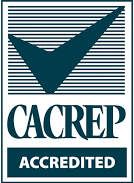Accreditation
Department COMMITMENT Statement
 The Counseling and Student Personnel (CSP) Department's primary purpose is to prepare professional counseling practitioners at the master’s and doctoral levels, fostering anti-oppressive change through culturally sustaining, anti-biased, anti-racist practices. CSP graduates embody respect, honesty, and integrity, maintaining high standards while cultivating caring relationships globally. Our collective work promotes diversity, equity, inclusion, and belonging in educational environments, guided by collaboration, scholarly endeavors, and practitioner engagements.
The Counseling and Student Personnel (CSP) Department's primary purpose is to prepare professional counseling practitioners at the master’s and doctoral levels, fostering anti-oppressive change through culturally sustaining, anti-biased, anti-racist practices. CSP graduates embody respect, honesty, and integrity, maintaining high standards while cultivating caring relationships globally. Our collective work promotes diversity, equity, inclusion, and belonging in educational environments, guided by collaboration, scholarly endeavors, and practitioner engagements.
The commitment of the department is achieved by the implementation of key performance indicators, which are:
Department Goals, Key Performance Indicators, & Objectives
- KPI 1 Learners will demonstrate their knowledge of professional roles, responsibility, and components of professional identity.
- KPI 2: Learners will understand and apply culturally responsive and sustaining counseling and advocacy skills.
- KPI 3: Learners will apply developmental theories to determine differing abilities and levels of functioning, recognize environmental factors that impact development, and select developmentally appropriate interventions.
- KPI 4: Learners will apply career assessments and engage in career counseling based on knowledge of theories and resources.;
- KPI 5: Learners will demonstrate the ability to establish a helping relationship and to effectively use counseling skills to facilitate culturally and developmentally responsive counseling sessions.
- KPI 6: Learners will understand and apply group counseling theories to recognize and respond to group developmental level while attending to group dynamics and effectively facilitating group counseling sessions.
- KPI 7: Learners will utilize appropriate assessment instruments considering clients’ concerns, culture, development, and context; the strengths and limitations of the instruments; and counselors’ ethical responsibility.
- KPI 8: Learners will evaluate research and integrate culturally sustaining, developmentally appropriate, evidence-based practices appropriate to their scope and design and implement evaluations of both interventions and programs.
Mental Health Counseling Objectives
- MHC 1: Students will demonstrate mastery of essential knowledge of intrapersonal, environmental, and interpersonal factors contributing to the development of or reduction in mental and emotional problems.
- MHC 2: Students will demonstrate effective use of a variety of information (e.g., direct observations, environmental knowledge, client self-expressions, current research) to analyze and integrate their clinical understanding of clients.
- MHC 3: Students will understand and apply efficient, effective and ethical counseling skills in individual and group mental health interventions to prevent and remediate mental and emotional concerns.
Professional School Counseling Objectives
- PSC 1: Students will master essential knowledge of intrapersonal, environmental, and interpersonal factors that contribute to the development of academic, personal, social, career success in K-12 settings.
- PSC 2: Students will master essential skills necessary to provide efficient, effective, and ethical interventions at individual, group, and whole-school level for development and enhancement of academic, personal, social, career success for all students in K-12 settings.
- PSC 3: Students will master essential skills and attitudes necessary to carry out the professional school counselor's role with diverse stakeholders in an efficient, effective, and ethical manner.
Accreditation Information
What is CACREP Accreditation?
CACREP (Council for Accreditation of Counseling and Related Educational Programs) was formed in 1981 in cooperation with the American Counseling Association to promote the advancement of quality educational programs in counselor training. For a program to receive accreditation, it hosts a CACREP survey team of counselor educators who review the program to see that it meets national standards in eight core areas of counseling: human growth and development, social/cultural foundations, the helping relationship, group dynamics/counseling, career development, appraisal, research, and professional orientation/issues. In addition to the core areas, the team reviews additional standards of instruction and supervised clinical experiences for the counseling specialty training offered by that program.
The Department of Counseling and Student Personnel (CSP) at Minnesota State Mankato is currently CACREP accredited at the doctoral level (set to expire March 2026) and at the master's level in two specialty areas:
- Mental Health Counseling
- Professional School Counseling
The CSP department collects on a yearly basis CACREP vital statistics published in the Counseling Programs Student Outcomes Report. For more information about CACREP and CACREP standards, please see the Council for Accreditation of Counseling and Related Educational Programs website.
Why is CACREP accreditation important for students selecting a program?
- Demonstrates an ongoing commitment to providing quality instruction and clinical experiences for students
- Streamlines the licensure process for Licensed Professional Counselors (LPC)/Licensed Professional Clinical Counselors (LPCC)
- Many state laws (including Minnesota) define required coursework and qualifying clinical experience by the CACREP standards
- Graduating students qualify to take the National Certified Counselor Exam (NCE) and the National Clinical Mental Health Counseling Examiniation (NCMHCE), used by most states for licensure
For more information on CACREP from the student's perspective, please see the CACREP Student Site.

